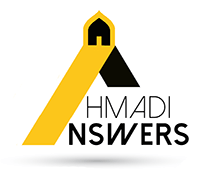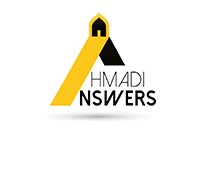The allegation of the anti Ahmadi Muslims is that Ahmadas stated that the Holy Prophetsaw misunderstood the meaning of Surah Zilzal. This is a complete lie and Ahmadas never said anything of such sort. They try to quote Izala-e-Auham page 128 and even that is empty of such a statement. This is a completely false allegaton and another lie of the anti Ahmadi Muslims. The real passage states:
“Our religious scholars have given a literal meaning of this Surah that earth will face severe earthquakes in the last days and it will be of such severity that the whole earth will become upside down and that what will be inside will come out. And human beings i.e.: – disbelievers [Kafira] will ask the earth what has happened to it. So that day earth will talk and tell its condition. These meanings and explanations are entirely wrong”
Most of the times, the non Ahmadi Muslims lie about translatons, but it seems as if they have forgotten to falsely translate it. Ahmadas clearly states that it is the religious scholars who have given this surah a literal meaning. Now do the anti Ahmadi Muslims believe the words of the scholars are the same as the Prophetsaw.
Now there is no proof that the expanation of Surah Zilzal which is attribtued by the scholars to the Holy Prophetsaw by later scholars was actually stated by him. Nor are all of the statements attributed to Ibn Abbasra automatically authentic to mean he himself stated them. In fact there is an entire false tafsir attributed to him. Ibn Abbasra was born three years before the Hijra and he was 13 years old during the demise of the Prophetsaw. Yahya Ibn Sa’id Al Qatan who was one of the greatest scholars of the ahadith according to the non Ahmadi Muslims himself stated that Ibn Abbasra only related about 4-10 traditions from the Prophetsaw himself (Asqalani, Imam Ibn Hajar, Tadhib al Tadhib, Volume 4, Pagee 474)
We do not necessarily accept this statement of the non Ahmadi Muslims, but one cannot deny that according to the Muslim scholars, Ibn Abbasra reported a few ahadith whcih are directly from the Prophetsaw. This itself shows that such statements were not said by the Prophetsaw nor can they be attributed to his companion. The Muslims themselves agree that much of what is attributed to Ibn Abbasra is forged. (Siddiqui, Dr Muhammad Zubayr, Hadith Literature, Page 34)
It is also important to notice that there is no mention of the Surah Zilzal tafseer in the most authentic collelctions including Bukhari and Muslim which itself shows that there is no explanation or such meaning of this surah. It is only included in the works that came much later and a lot was attributed to this companion. We have to realize that Ibn Kathir and imam Suyuti were great scholars, but also had msitakes and were not infallible. They both have many weak narrations in their books as well as some which are attributed to the Prophetsaw. We need to analyze the ahadith before accepting them and the non Ahmadi Muslims forget to do this. They try to defend ahadith which declare the Prophets to have lied. There is a hadith related by Imam Suyuti which states:
“When God Almighty wanted to create Himself, He created the horse first and let it gallop till it sweated. Then He created Himself from its sweat (Imam Suyuti, Al L’ali al Masnu’a fi AlAhadeeth al Maudu’a)
Another tradition from Ibn Kathir states:
“The Prophet took hold of Ali’s hand in the presence of the companions, on his way back from the farewell Hajj. He let him stand till all of them knew him. Then he said:This is my attorney and brother and the caliph after me. So listen to him and obey him” (Kathir, Ismail Ibn Al Al Bidaya wal al Nihaya)
We all know that sch ahadith are against the Qur’an and cannot be accepted. They also contradict more authentic ahadith. These narrations are included in the works of both Ibn Kathir and Imam Suyuti. There is a attributed hadith by Muhammad Bin Sa’id al Maslub who stated on the authority of Anas Bin Malikra that the Prophet said:
“I am the seal of the Prophets except if Allah Wishes”(Sayuti, Imam Hafiz Jalal Ud Din Abd Al Rahman, Tadrib Al Rawi page 186)
Now would the non Ahmadi Muslims accept such ahadith that contradict the Qur’an. There are plenty more Qur’anic ayahs and Surahs where the explanations are fabrications and not try said by the Prophetsaw nor his companions.The tafseer attributed to Ibn Abbas about Surah Zilzal is against the wisdom of Allah and cannot be accepted. Since these meanings of Surah Zilzal contradict the essence of the Qur’anic teachings, they cannot be accepted. There is a hadith which reports that Ibn Abbasra along with Umarraused to dissuade people from offering two rakahs after the Asr prayers since they thought the Prophetsaw did not allow this. This is an issue they were misunderstood with which shows that although this tafseer is not from him, they are not infallible. The hadith is:
حَدَّثَنِي حَرْمَلَةُ بْنُ يَحْيَى التُّجِيبِيُّ، حَدَّثَنَا عَبْدُ اللَّهِ بْنُ وَهْبٍ، أَخْبَرَنِي عَمْرٌو، – وَهُوَ ابْنُ الْحَارِثِ – عَنْ بُكَيْرٍ، عَنْ كُرَيْبٍ، مَوْلَى ابْنِ عَبَّاسٍ أَنَّ عَبْدَ اللَّهِ بْنَ عَبَّاسٍ، وَعَبْدَ الرَّحْمَنِ، بْنَ أَزْهَرَ وَالْمِسْوَرَ بْنَ مَخْرَمَةَ أَرْسَلُوهُ إِلَى عَائِشَةَ زَوْجِ النَّبِيِّ صلى الله عليه وسلم فَقَالُوا اقْرَأْ عَلَيْهَا السَّلاَمَ مِنَّا جَمِيعًا وَسَلْهَا عَنِ الرَّكْعَتَيْنِ بَعْدَ الْعَصْرِ وَقُلْ إِنَّا أُخْبِرْنَا أَنَّكِ تُصَلِّينَهُمَا وَقَدْ بَلَغَنَا أَنَّ رَسُولَ اللَّهِ صلى الله عليه وسلم نَهَى عَنْهُمَا . قَالَ ابْنُ عَبَّاسٍ وَكُنْتُ أَصْرِفُ مَعَ عُمَرَ بْنِ الْخَطَّابِ النَّاسَ عَنْهَا . قَالَ كُرَيْبٌ فَدَخَلْتُ عَلَيْهَا وَبَلَّغْتُهَا مَا أَرْسَلُونِي بِهِ . فَقَالَتْ سَلْ أُمَّ سَلَمَةَ . فَخَرَجْتُ إِلَيْهِمْ فَأَخْبَرْتُهُمْ بِقَوْلِهَا فَرَدُّونِي إِلَى أُمِّ سَلَمَةَ بِمِثْلِ مَا أَرْسَلُونِي بِهِ إِلَى عَائِشَةَ . فَقَالَتْ أُمُّ سَلَمَةَ سَمِعْتُ رَسُولَ اللَّهِ صلى الله عليه وسلم يَنْهَى عَنْهُمَا ثُمَّ رَأَيْتُهُ يُصَلِّيهِمَا أَمَّا حِينَ صَلاَّهُمَا فَإِنَّهُ صَلَّى الْعَصْرَ ثُمَّ دَخَلَ وَعِنْدِي نِسْوَةٌ مِنْ بَنِي حَرَامٍ مِنَ الأَنْصَارِ فَصَلاَّهُمَا فَأَرْسَلْتُ إِلَيْهِ الْجَارِيَةَ فَقُلْتُ قُومِي بِجَنْبِهِ فَقُولِي لَهُ تَقُولُ أُمُّ سَلَمَةَ يَا رَسُولَ اللَّهِ إِنِّي أَسْمَعُكَ تَنْهَى عَنْ هَاتَيْنِ الرَّكْعَتَيْنِ وَأَرَاكَ تُصَلِّيهِمَا فَإِنْ أَشَارَ بِيَدِهِ فَاسْتَأْخِرِي عَنْهُ – قَالَ – فَفَعَلَتِ الْجَارِيَةُ فَأَشَارَ بِيَدِهِ فَاسْتَأْخَرَتْ عَنْهُ فَلَمَّا انْصَرَفَ قَالَ “ يَا بِنْتَ أَبِي أُمَيَّةَ سَأَلْتِ عَنِ الرَّكْعَتَيْنِ بَعْدَ الْعَصْرِ إِنَّهُ أَتَانِي نَاسٌ مِنْ عَبْدِ الْقَيْسِ بِالإِسْلاَمِ مِنْ قَوْمِهِمْ فَشَغَلُونِي عَنِ الرَّكْعَتَيْنِ اللَّتَيْنِ بَعْدَ الظُّهْرِ فَهُمَا هَاتَانِ ” .
Kuraib, the freed slave of Ibn ‘Abbas, reported that ‘Abdullah b. ‘Abbas, ‘Abd al-Rahman b. Azhar, al-Miswar b. Makhrama sent him to ‘A’isha, the wife of the Messenger of Allah (ﷺ), telling him to give her their greetings, and ask her about the two rak’ahs after the afternoon prayer, (for)” we have heard that you observe them whereas it has been conveyed to us that the Messenger of Allah (ﷺ) prohibited their observance.” Ibn ‘Abbas said:
I along with ‘Umar b. al-Khattab dissuaded people to do so (to observe two rak’ahs of prayer). Kuraib said: I went to her (‘A’isha) and conveyed to her the message with which I was sent. She said: (Better) ask Umm Salama. So I went to them (those who had sent him to Hadrat ‘A’isha) and informed them about what she had said. They sent me back to Umm Salama with that with which I was sent to ‘A’isha. Umm Salama said: I heard the Messenger of Allah (ﷺ) prohibiting them, and then afterwards I saw him observing them. And when he observed them (two rak’ahs) he had already observed the ‘Asr prayer. Then he (the Holy Prophet) came, while there were with me ladies of Banu Haram, a tribe of the Ansar and he (the Holy Prophet) observed them (the two rak’ahs). I sent a slave-girl to him asking her to stand by his side and say to him that Umm Salama says: Messenger of Allah, I heard you prohibiting these two rak’ahs, whereas I saw you observing them; and if he (the Holy Prophet) points with his hand (to wait), then do wait. The slave-girl did like that. He (the Holy Prophet) pointed out with his hand and she got aside and waited, and when he had finished (the prayer) he said: Daughter of Abu Umayya. you have asked about the two rak’ahs after the ‘Asr prayer. Some people of ‘Abu al-Qais came to me for embracing Islam and hindered me from observing the two rak’ahs which come after the noon prayer. So those are the two I have been praying. (Sahih Muslim Book 4, Hadith #1814)
We even find false ahadith in the books like Bukhari and Sahih Muslim which should also not be blindly accepted. For example it is narrated:
حَدَّثَنَا سَعِيدُ بْنُ تَلِيدٍ الرُّعَيْنِيُّ، أَخْبَرَنَا ابْنُ وَهْبٍ، قَالَ أَخْبَرَنِي جَرِيرُ بْنُ حَازِمٍ، عَنْ أَيُّوبَ، عَنْ مُحَمَّدٍ، عَنْ أَبِي هُرَيْرَةَ ـ رضى الله عنه ـ قَالَ قَالَ رَسُولُ اللَّهِ صلى الله عليه وسلم “ لَمْ يَكْذِبْ إِبْرَاهِيمُ إِلاَّ ثَلاَثًا ”.
Narrated Abu Huraira:Allah’s Messenger (ﷺ) said, “Abraham did not tell a lie except on three occasions.”(Sahih al Bukhari, Hadith #3357)
Sadly, the non Ahmadi Muslims have went so low to give such ahadith which are clearly not stated by the Prophtsaw to be given more precedence than the Qur’an which clearly states Prophets do not lie and are the most truthful.



